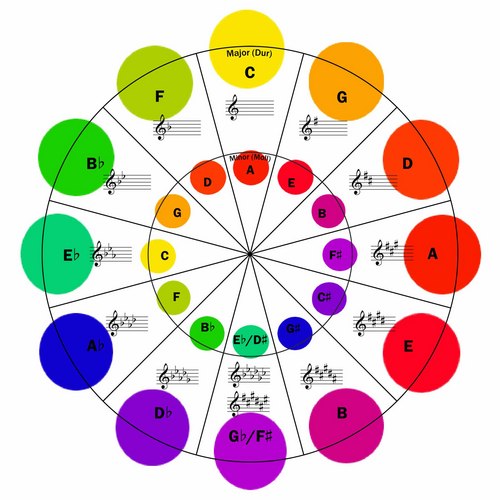- Playing portion:
- Bb Major, G Natural Minor, G harmonic minor (ascending and descending)
- F major, D natural minor, d harmonic minor (staccato quarter notes)
- Eb major, C natural minor, C harmonic minor (ta ti-ti ti-ti ta)
- Sight-read 8 measures (will be a selection from the Standard of Excellence Blue Books)
- Written portion:
- Create a transposing circle of fifths (like the one hanging on the board)
- Match vocabulary terms
- Write a variation on Jingle Bells
- Listening portion:
- Describe the mood, style/era, instruments, rhythms, tempo, dynamics, and what you liked about the performance. Compare/Contrast the 2 performances played by different ensembles.

In addition to this circle of fifths, the Bb transposition will need to be on another inner circle. Relative Minor key/Eb instruments are the inner circle on the diagram above.
To find the Bb key, add 2 sharps to the concert key, and raise the note 1 whole step. C becomes D, G becomes A, D becomes E, A becomes E, E becomes F#, B becomes C#/Db, Gb/F# becomes Ab, Db becomes Eb, Ab becomes Bb, Eb becomes F, Bb becomes C, and F becomes G.
The sight-reading will include accidentals and various rhythms.

This is the version of Jingle Bells you will be asked to alter to create your own variation. You can practice at home to make sure you can do this well on the test. Think of interesting rhythms, changing the style, adding rests, changing the key, or adding some more interesting notes in the melody.
For the listening section, test your skills at home on the following recordings:
1. mood -
2. style/era -
3. instruments -
4. rhythms -
5. tempo, -
6. dynamics -
7.What did you enjoy about the performance?
Compare/Contrast the 2 performances played by different ensembles. Which did you like better and why?
Find the definition for the following words
- Syncopation
- Staccato
- Articulation
- Antonin Dvorak - a Romantic era composer who wrote the New World Symphony while visiting American in the 1890s.
- Circle of Fifths
- Major Scale
- Relative Minor
- Parallel Minor
- Natural Minor scale
- Harmonic Minor scale
- Melodic Minor scale
- Mode
- Rhythm
- Movements
- Variation
- Tempo
- Beat
- Composer
- Transposition
- Key Signature
- Time Signature
- Legato
- Accidentals
- Melody
- Harmony
- Countermelody
No comments:
Post a Comment